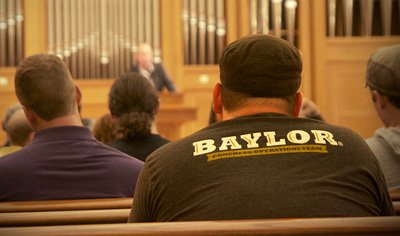EDITORIAL: Raise ‘a new generation of pastors’
If you haven't met David Hardage and heard his stump speech, you should take advantage of an opportunity to do so soon. He's the fellow who writes the column at the bottom of this page and the relatively new executive director of the Baptist General Convention of Texas.

|
Given the chance, he speaks eloquently and passionately about our state convention. One topic that particularly resonates is his call for Texas Baptists to raise up "a new generation of pastors." We aren't producing enough pastors to meet the current demand, much less providing qualified pastors to start hundreds of churches we must plant in the next few years, he says. And he's absolutely on target; we need pastors like never before.
As recently as a generation ago, the pastorate—and often missions, as well as other church ministries—stood out as a respected and appealing profession. Clergy often ranked among the revered leaders of Texas towns and other communities across the South and Southwest. Christian parents hoped their children, and particularly their sons, would consider the ministry. Churches took pride in counting the number of pastors, missionaries and church staff they produced. Young folks answered to "preacher boy" as a term of endearment.
Now? Not so much.

Several factors contribute to the declining desirability of the pastorate. They include:
• Generally diminished respect for church.
• Dwindling respect for authority.
• Overall increase in education levels, which closed the gap between the academic attainment of laity and clergy.
• Moral failure of some clergy.
• Escalating materialism of the prevailing culture and the sense ministerial pay doesn't provide a decent return on investment, of either time or tuition.
Beyond these issues, the No. 1 reason Baptists and other Christians aren't producing enough pastors is we do not value and respect the pastorate—our pastors—as we did a generation and more ago.
Raising up pastors is like orchard farming. It requires long-range vision, patience, persistence and voluminous amounts of faith and hope. A new generation of pastors—and other missionaries and ministers—won't appear in a couple of years, just because we decide we need them. The gap from the time high schoolers begin to consider a call to ministry and completion of seminary spans a decade or more. So, we must get busy. Now.
It's time for pastors and lay leaders to "call out the called." We should encourage our brightest and most winsome teenagers to consider ministry—and especially the pastorate—as a serious option for their lives. Some churches will speak these words of encouragement to girls and boys, while others will focus on boys. That is a local-church decision. But the imperative is to urge young people to think about serving the Lord in churches.
We should encourage pastors and church staff to mentor faithful teens. We should allow young people to shadow our clergy and provide them with opportunities for meaningful participation in the full life of the church, including occasional preaching and involvement in decision-making.
We should make sure ministry-minded young people receive an opportunity to earn college and seminary degrees. This could take the form of church scholarships or low-interest loans. It certainly will involve encouragement and affirmation.
We should make sure young ministers start well. This will involve myriad opportunities. They include funded and mentored support for young church planters, as well as residency and apprentice programs for brand-new ministers.
We also should not overlook young adults, who may change careers and still invest 30 or more years in productive ministry.
In our zeal, we must not forsake discernment. Do not send young people to seminary if your congregation, which knows them best, would not call them to serve your church.
Bumper crops of pastors and other ministers won't grow up like weeds. We must plant and cultivate them.
Marv Knox is editor of the Baptist Standard. Visit his blog at baptiststandard.com.